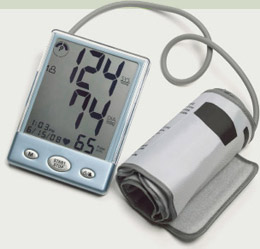
Risk factors for high blood pressure - and the serious health conditions that can follow.
Posted in General Health & Wellness on March 3, 2011. Last modified on February 01, 2018. Read disclaimer.
Nearly 1 in 3 American adults and 1 in 5 Canadians have high blood pressure. High blood pressure increases your risk of serious conditions including coronary heart disease, heart failure, stroke, kidney failure and more. However, many people are unaware they even have it since high blood pressure itself normally shows no symptoms.
+ Free Shipping & Returns on Eligible Items.
(*Amazon's Top 100 list updated hourly.)
Some of the major risk factors for high blood pressure include:
- Age -- Males over 45 and females over 55 have a higher risk of high blood pressure.
- Race/ethnicity -- Anyone can have high blood pressure, but it's especially prevalent in African- Americans, often with an earlier onset and increased severity. Plus, African-Americans have a higher rate of death from stroke and kidney disease than Caucasian or Hispanic- American adults.
- Unhealthy lifestyle habits -- Certain lifestyle habits can increase your risk, such as too much alcohol, not enough potassium, inactivity and smoking.
- Overweight or obesity
- Family history of high blood pressure and prehypertension (a blood pressure reading of 120-139/80-89 mmHg).
- The sodium connection -- For some people, too much sodium in the diet can lead to higher blood pressure. Sodium keeps excess fluid in the body, which puts a strain on the heart. According to the Centers for Disease Control and Prevention (CDC), eating less sodium can help prevent, lower or even control blood pressure. A CDC study shows that 2 out of 3 adults in the United States are at high risk from sodium-related health problems.
What is a high blood pressure reading?
You'll often see blood pressure readings written as systolic (blood pressure when the heart is pumping blood) over diastolic (blood pressure when the heart is at rest - between beats) and looks something like 120/80. Blood pressure can vary throughout the day and by stress or activity levels. If your numbers are above 120 (systolic) or 80 (diastolic) most of the time, however, you may be developing or already have high blood pressure and should talk with a doctor.
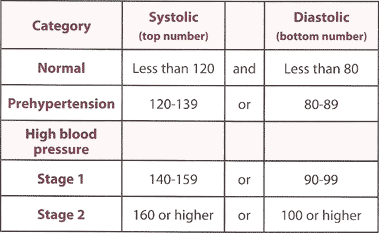
Tips for bringing or keeping your blood pressure under control:
- eat a diet that is low in saturated fat, total fat and cholesterol.
- consume plenty of fruits, vegetables and low-fat dairy products.
- limit your salt. Adults should consume less than 2,300 mg of sodium daily -- and less than 1,500 mg daily if you already have high blood pressure. Keep in mind that one teaspoon of table salt contains 2,300 mg of sodium.
- get at least 30 minutes of moderate physical activity at least 5 days per week.
- stay within a healthy weight range
- stop or don't start smoking
- manage the stress in your life
 The salt and high blood pressure connection
The salt and high blood pressure connection
You may be consuming too much sodium
Our bodies need sodium: it regulates blood pressure and blood volume and plays a key role in muscle and nerve function. But too much sodium in your diet can pose health hazards, including high blood pressure and increased risk of heart attack or stroke. The good news? You can help reduce your daily sodium intake with some simple dietary changes.
Tips for reducing your sodium intake
Although cutting back on table salt sounds like the easy solution, all forms of sodium need to be taken into consideration. only 6% of our daily intake of sodium comes from added table salt. Most of our sodium intake comes from packaged, processed, store-bought and restaurant food (about 77% of it, in fact). Naturally occurring sodium accounts for about 12% of daily intake and 5% comes from salt used in cooking.
You can help reduce your sodium consumption by incorporating these tips into your daily diet:- Buy fresh, frozen or canned "no salt added" vegetables
- Use fresh meats rather than canned or processed types
- Use herbs, spices and salt-free seasonings to make foods tasty without using salt
- Cut back on frozen dinners, pizza, packaged mixes, canned soups or broth and salad dressings
- Rinse canned foods to remove some sodium
- Buy low- or reduced-sodium, or no-salt-added varieties of foods
- Check food labels for sodium amount
Sodium can also be found in certain over-the-counter and prescription medications. Consult your healthcare provider about potential sodium content.
From the Research Desk...
Social stress can increase inflammation
 Los Angeles, California - People in stressful social situations show greater increases in inflammation, researchers from UCLA reported in the Proceedings of the National Academy of Sciences.
Los Angeles, California - People in stressful social situations show greater increases in inflammation, researchers from UCLA reported in the Proceedings of the National Academy of Sciences.
In the study, 124 volunteers were placed in awkward social situations: giving an impromptu speech, performing difficult mental arithmetic and taking part in an online game. In all scenarios, participants were subjected to social rejection.
Researchers discovered that participants who showed increased activity in brain regions that responded to social stress also had increases in inflammatory activity when exposed to acute social stress in the lab.
"This is further evidence of how closely our mind and body are connected," said George Slavich, a postdoctoral fellow at the UCLA Cousins Center for Psychoneuroimmunology. "We have known for a long time that social stress can 'get under the skin' to increase risk for disease, but it's been unclear exactly how these effects occur. To our knowledge, this study is the first to identify the neurocognitive pathways that might be involved in inflammatory responses to acute social stress."
Researchers noted that chronic inflammation can put people at risk for a variety of health conditions including heart disease, depression, certain cancers and more.
Omega-3 may help protect against brain injury damage
Morgantown, West Virginia - Use of Omega-3 fatty acids prior to a brain injury may help reduce the resulting damage, scientists reported in the journal Neurosurgery. These same researchers discovered in past studies that the Omega-3 fatty acid docosahexaenoic acid (DHA) showed positive results in post-injury treatment and wanted to test its effects when given prior to injury.
Using rats, researchers administered DHA for 30 days and then induced traumatic brain injuries. The rats given the highest amounts of DHA experienced the least amount of tissue damage.
The scientists concluded, "The potential for DHA to provide prophylactic [preventive] benefit to the brain against traumatic injury appears promising and requires further investigation."
Too much TV or computer time may be bad news for the heart
London, United Kingdom - Spending more than two hours per day watching TV or on the computer can increase the risk of a cardiac event, according to a study in the Journal of the American College of Cardiology.
 Researchers followed 4,512 Scottish men for four years and found that those men who spent two or more hours in front of a screen every day were 125% more at risk of a cardiac event than those who watched less. Those who watched four
hours or more were 48% more likely to die from any cause.
Researchers followed 4,512 Scottish men for four years and found that those men who spent two or more hours in front of a screen every day were 125% more at risk of a cardiac event than those who watched less. Those who watched four
hours or more were 48% more likely to die from any cause.
Scientists concluded that inflammation and metabolic risk factors partly played a role. C-reactive protein, a marker for inflammation, was two times higher in those with four or more hours of screen time than those with less than two hours.
Physical activity did not lessen the risk of cardiac events.

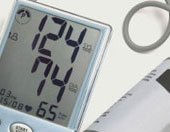 High blood pressure risk factors
High blood pressure risk factors Protecting your eyes and eyesight
Protecting your eyes and eyesight Living safely with house pets
Living safely with house pets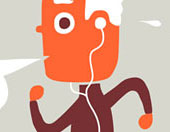 Natural body detox through exercise
Natural body detox through exercise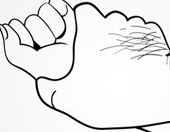 Domestic violence assistance
Domestic violence assistance Important role of grandparents
Important role of grandparents Concerns and risks of Vitamin D deficiency
Concerns and risks of Vitamin D deficiency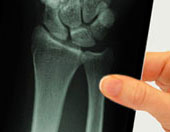 What is carpal tunnel syndrome?
What is carpal tunnel syndrome? Poison oak, ivy and sumac rash prevention
Poison oak, ivy and sumac rash prevention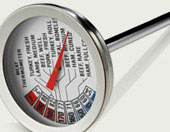 Safety tips for preventing food poisoning
Safety tips for preventing food poisoning